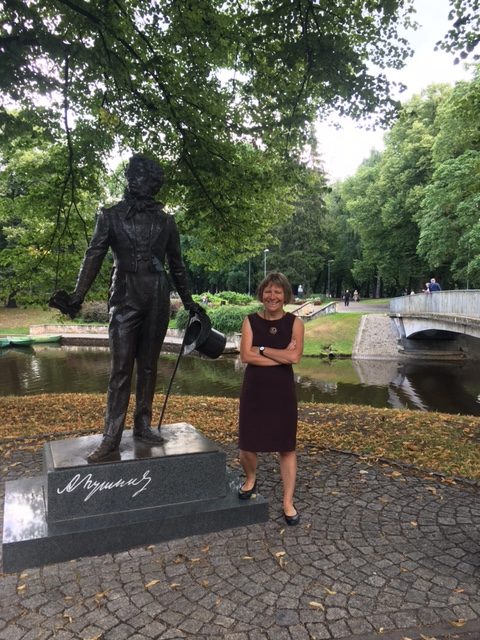When Alex and I visit our summer apartment in Kinghorn, there’s always something that doesn’t work and isn’t easy to fix. This time it was the hot water boiler, and the only two people in the area able to repair it were both unavailable. So, we decided to go to the swimming pool in Kirkcaldy, to swim and to use the showers. As the weather was good, we went there on foot; it was only a forty-minute walk, and besides, the whole point of going on holiday is to stay outdoors as much as possible.
We left in high spirits. Alex was even running and jumping up and down when we were passing the empty caravan park perched on the rocks north of Kinghorn. But when we were approaching Kirkcaldy, his mood had dropped. He said that it made little sense to walk for so long just to reach this town, as if a different destination might warrant the effort, but not there. I replied that our itinerary was agreed on the previous evening, but this only made him sulk more. I realized that I’d forgotten to pack shampoo, which meant that we had to stop on the way to the swimming pool to buy some. This made Alex even grumpier; he hated shopping, and in Kirkcaldy especially so. He followed me into Aldi in his unsettling walk, asking repeatedly “where is it?” when I tried to find the shelf with cosmetics. There was no point to chastise him, because in a deeper sense his behavior was rational. Kirkcaldy made me sulky too. I couldn’t imagine a gloomier place. It greeted visitors with a row of grey high-rise blocks, ex-council flats. After that, there was a building site of what had been intended to be a collection of luxury apartments, as the sign announced. It was, however, abandoned by its constructors long before it could display any opulence. The building looked now like a cross between a skeleton and a cripple; some of the gaps intended for windows were boarded up, others served as rubbish bins for passersby. In a warmer climate or a poorer place such a building might be occupied by homeless people, furnishing it with some human touch. In Kirkcaldy, however, the impression was that of a void. Next to the unfinished apartment block was a box-shaped building to which two signs were attached, “Pet Food” and “For Sale.” It must have been for sale for ages, as I had no memory of there ever being a pet shop. Life for humans was wretched enough without bringing animals into the suffering. After this there was another ghost in the form of an old swimming pool, followed by the back of Mercat, the main shopping center in Kirkcaldy, a concrete- saturated, slowly dying relic from the 1970s, my favorite decade, yet one which Scotland tried to forget. Needless to say all the buildings which we were passing were grey, as was the sky, although the day was sunny when we were leaving Kinghorn.
By the time we entered the pool, Alex’s mood had improved, perhaps because the walking was over. He wondered whether the pool would be guarded by the Sea Monster. We gave this name to one female swimming attendant because it seemed like her ultimate raison d’etre was to make the swimmers leave the pool. For example, although she remembered us, she always enquired whether Alex swam well enough to use the adult lanes. Then, after fifteen
minutes or so, when it was clear that he was a good swimmer, she ordered him to return to the pool for small children. She also demanded that everybody swim in absolute silence and not commit even the most minute act of naughtiness.
The Sea Monster was there, and she was blooming because that day the pool offered an extra attraction, a pumped-up barge in the shape of her double, an inflatable serpent which covered half of the large pool, leaving just two lanes for those who actually wanted to swim. The female Sea Monster tried to make the most of the obstructive power of this gadget by ordering her coworkers to take it out immediately after it was put in the water and carry it around the pool, which proved an onerous task. To make things worse, she insisted that the few people who were trying to swim, including us, get out of the water, which created an extra obstruction for the four or five young girls and boys who tried to remove the sea monster from the pool. The situation was so absurd that Alex and I started to giggle. Our pleasure was increased by the fact that on this occasion it was not us who were arguing with the Sea Monster, but a big tattooed man with drooping moustache and sideburns, who emerged from the pool like a walrus and told the woman that on the day when there were practically no children in the pool, putting the barge there made no sense. Then he ordered everybody to return to the water, and he carried the rubber sea monster to the back room all by himself. For the rest of our stay the Walrus behaved as if the whole pool belonged to him, jumping, splashing and shouting to his slightly less tattooed pal, while the defeated Sea Monster sat in her place at the top, looking melancholically at the invisible horizon and paying no attention to the swimmers. In the end, we were almost sorry for her.
On the way back we marched towards the Kirkcaldy station, to take a train to Kinghorn. The sky was still cloudy, but the clouds were delicate and white, and the sun was trying to pierce the heavenly cotton wool. Three seagulls were walking on the pavement, undeterred by the passersby, as if they were a military patrol, making us laugh. It felt good to be clean, and also tired from physical effort. We talked about the pizza we would order on our arrival home. And then we saw a small crowd gathered on the street some hundred or so meters from the station. There’d been an accident: a boy of about ten was hit by a car, and people were waiting for an ambulance. We couldn’t see the victim, but Alex showed me a small spot of blood on the asphalt. The blood was crimson, more like paint or theatrical makeup pretending to be blood than real blood itself. We didn’t say anything on the train but felt guilty about criticizing Kirkcaldy for its lack of drama.


